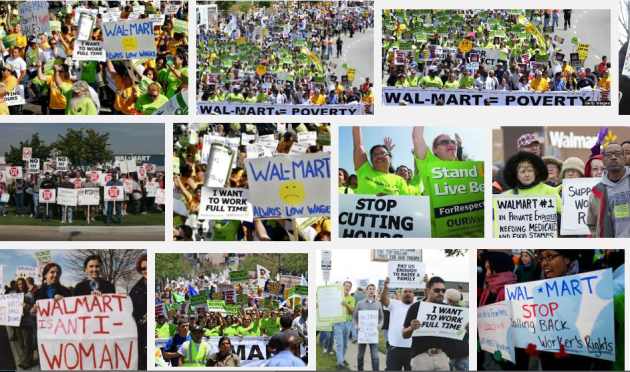Cloaking Inequity: Back-to-School? Classrooms by Walmart?: Feel Guilty About Shopping at Walmart

Honestly, I felt guilty on the rare occasion that I shopped at Walmart. Yes I have shopped at Walmart. I didn’t want to, but sometimes at midnight I had no other choice when I needed emergency water for my Discus aquarium and spaghetti sauce. Walmart politics are of course objectionable to me, but they litter the Texas landscape— they are inescapable. One of the surprises about my move to California is that I haven’t even seen a Walmart in Sacramento yet. Of course they exist, but in Texas you can’t spit without hitting a Walmart.

Walmart’s issues have been well documented. For example, the PBS documentary Store Wars included the following:
Wal-Mart employs more people than any other company in the United States outside of the Federal government, yet the majority of its employees with children live below the poverty line. “Buy American” banners are prominently placed throughout its stores; however, the majority of its goods are made outside the U.S. and often in sweatshops.
The sentiment behind Wal-Mart founder Sam Walton’s promise of a “better life for all” belies questionable business practices – many that have been challenged by employees, unions, environmentalists, recording artists and human rights organizations.
Forbes magazine, polling business executives (not employees) has ranked Wal-Mart among the best 100 corporations to work for. Yet the employees on average take home pay of under $250 a week. The salary for full-time employees (called “associates”) is $6 to $7.50 an hour for 28-40 hours a week, which is typical in the discount retail industry. This pay scale places employees with families below the poverty line, with the majority of employees’ children qualifying for free lunch at school. When closely examined, this amounts to a form of corporate welfare, as the taxpayer subsidizes the low salaries. One-third are part-time employees – limited to less than 28 hours of work per week – and are not eligible for benefits.
Whereas Wal-Mart employees start at the same salary as unionized employees in similar lines of work, they make 25 percent less than their unionized counterparts after two years at the job. The rapid turnover – 70 percent of employees leave within the first year – is attributed to a lack of recognition and inadequate pay, according to a survey Wal-Mart conducted. Yet this can work to the company’s advantage, since it is more difficult for unions to organize when there is constant employee turnover. [This sounds like the University of Texas at Austin]
Then there is this Back-to-School email sent to employees of a Texas school district where it is made clear by the district that Walmart does not want to be a federal contractor— so employees of the district are restricted from purchasing non-food Back-to-School items from Walmart. (Thank to JCR for the email tip)
Subject: [csmscampus] URGENT: Walmart and Sams Purchases
To all CSISD Employees
Background
The Bryan and College Station Walmart and Sam’s Club stores chose not to return as a vendor for Region VI and College Station ISD. This is a quote from the ESC Region VI Cooperative representative.
“It is with great despair that I inform you that Walmart will not be an approved vendor for the 2014-2015 year. The current contract we have with Walmart is set to expire July 1st. After weeks of ongoing talks with Walmart Corporate office, their legal department has chosen not to sign the ESC6 Coop bids. Their reasoning is that they do not sign contracts with organizations who receive federal funds, they do not want to become a federal contractor.”
Action
As of July 25, 2014, Walmart and Sam’s are approved CSISD vendors for only food and drinks. We may continue to purchase food and drinks at the local Walmart and Sam’s stores, but we are not allowed to expend school funds on other items. Food and drinks are available for purchase from retail stores in small quantities because they are considered as “non-bid” commodities according to purchasing laws and rules.
CSISD funds may not be used to purchase non-food or non-drink items from Walmart or Sam’s stores, but Walmart credit cards and Sam’s purchase orders are still available exclusively for food and drink purchases. Personal expenditures to Walmart and Sam’s are not reimbursable expenses.
To assist in fulfilling your purchasing needs, we recommend utilizing these links that are found at the CSISD website on the Purchasing Department webpage.
- CSISD Warehouse inventory
Be sure and complete the “New Product Request Form” if you don’t see what you need. This will help us stock our warehouse with the best products.- Office Supplies
Try one of our approved office supply vendors for office supplies, break room type food and drinks and for those incidentals such as Band-Aids, tissues, paper plates, cups and plastic forks, etc…..- Instructional Supplies
Try one of our approved instructional or office supply vendors for classroom and instructional supplies.This action does not impact our purchasing opportunities at any other retail or wholesale stores routinely used by our employees for district purchases.
We are aware of the costliness and inconvenience that will occur due this decision made by Walmart management and we are working within the scope of our available resources to assist you. The administration is scheduling a meeting with local Walmart management to express our concerns and discuss possible remedies. ESC Region VI representatives are also continuing their negotiations with Walmart Corporation.
If there are any changes regarding the Walmart and/or Sam’s vendor status, I will communicate with you immediately.
Sincerely,
Glynn Walker
Deputy Superintendent
Business and Operations
1812 Welsh
College Station TX 77840
p 979.764.5476 f
979.694.5825
gwalker@csisd.org

I asked two attorneys why Walmart would not want to be a federal contractor. One said:
It would likely subject them to requirements for the contract that Walmart is not willing to assent to. Could be workers’ rights related, for example not wanting to pay the higher minimum wage required for federal contractors, or it could be related to requirements on the products themselves, for example some sort of requirement related to domestic production…
The other commented:
…The first thought I have is that affirmative action laws from EEOC apply to federal contractors.
Ah, equality. Walmart doesn’t seem to interested in it based on their policies.

So what about “Back-to-School” and “Walmart in the Classroom”? A teacher from California emailed me the following:
Shopping at Wal-Mart: Low Prices at a High Cost to Our Kids’ Education
I have been a public school teacher for 11 years, and each year when I look at ads for back-to-school sales, there is one circular to which I’ve never given even a second’s glance. When I see the low prices that Walmart’s ads boast, I don’t get excited about savings. Instead, I think about my students whose moms and dads work for Walmart.
For 5 years, I taught math for Cincinnati Public School District, and each year, a few of my students had parents or other family members who worked at Walmart stores. I got to know these parents over their school year, and they would often share their struggles to make ends meet. They all worried about the impact Walmart’s low pay and working conditions had on their children’s education.
I remember parents who lost sleep over whether they should work night hours to pay the bills and buy food, or be at home to help their kids with homework and school projects. I remember one parent who told me that her schedule was so choppy that she didn’t know from week to week if she would be able to pick up her kids at the end of the school day. Others had to miss parent-teacher meetings each year and never saw their kids perform in school plays, sports games and band recitals.
In the name of lower prices and in Walmart’s pursuit of higher profits (they already make around $16 billion each year), the company has crippled hundreds of thousands of families’ ability to care for their children and support their education. Every teacher knows that students who are healthy are better students. Students whose families have basic economic security do better.
It’s disheartening that Walmart chooses to focus its time and energy on advertising to teachers, rather than taking the steps it easily could to improve the lives of millions of kids. More than nearly any other company, Walmart is positioned to do something truly revolutionary for families and education in America. Simply put – if Walmart paid its employees good wages and ended its confounding scheduling practices, hundreds of thousands of moms and dads could be there for their kids and involved in their education.
From afar, lower prices seems like a benefit to teachers and shoppers, but the true costs to our kids’ education and futures are not accounted for here. If we were to include those costs to society, we’d undoubtedly choose another place to shop.
This year, I am not shopping at Wal-Mart for my child’s school supplies or for supplies for my classroom. Ultimately, any savings come at a cost that I am not willing to spend.
Natara Warren, a public school teacher for 11 years, lives in Los Angeles. Previously, she worked in the Cincinnati Public School District as a math teacher and as an instructional coach for K-6th grade math teachers.

Then there is this on Walmart and poverty from Common Dreams:
In their annual report, filed with the U.S. Securities and Exchange Commission last week, the retail giant lists factors that could potentially harm future profitability. Listed among items such as “economic conditions” and “consumer confidence,” the company writes that changes in taxpayer-funded public assistance programs are also a major threat to their bottom line.
The company writes:
Our business operations are subject to numerous risks, factors and uncertainties, domestically and internationally, which are outside our control … These factors include … changes in the amount of payments made under the Supplement[al] Nutrition Assistance Plan and other public assistance plans, changes in the eligibility requirements of public assistance plans …
Walmart, the nation’s largest private employer, is notorious for paying poverty wages and coaching employees to take advantage of social programs. In many states, Walmart employees are the largest group of Medicaid recipients.
However, this report is the first public acknowledgement of the chain’s reliance on the funding of these programs to sustain a profit.
According to Stacy Mitchell, senior researcher with the Institute for Local Self-Reliance, the irony of their admission is that Walmart “is the company that has done, perhaps, more than any other corporation to push people into poverty.”
Citing a Penn State study, Mitchell told Common Dreams that research has proven that “when Walmart opens a store, poverty rates are negatively impacted” and that the more stores that have opened in a particular county, the worse it is. “This is a company that everywhere it goes it creates poverty.”
Walmart respect teachers! Respect your workers!
This blog post has been shared by permission from the author.
Readers wishing to comment on the content are encouraged to do so via the link to the original post.
Find the original post here:
The views expressed by the blogger are not necessarily those of NEPC.
